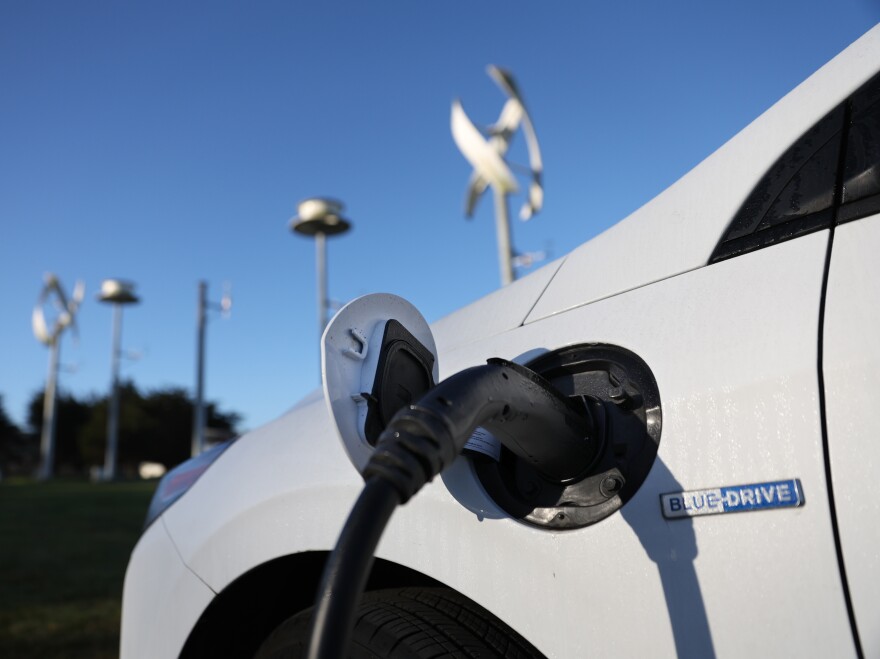Electric vehicles are widely seen as the future.
Ford will soon start delivering its shiny new F-150 Lightning, the electric version of its pickup truck, and other auto makers are racing to electrify their most popular models.
But many drivers considering switching to electric vehicles cite a similar concern: the hypothetical nightmare of getting stuck in the middle of nowhere without any battery left.
The Biden administration has an ambitious plan to address that. It wants to build tons of chargers so that they become as common as a gas station, and closer to the ease and speed of pumping gas.
Here's how the plan would work – and what it would mean for electric car owners and prospective buyers.
What's the plan?
The federal government will spend $5 billion dollars to build 500,000 chargers. The money will go to states, who have until late summer to submit their plans to the federal government.
The funding comes with strings attached – strings intended to ensure that this network of chargers is fast, reliable, and convenient.
To that end, states are to prioritize building chargers along the interstate highway system. Each charging station is required to include at least four fast-speed plug-ins. And chargers must be non-proprietary, meaning they connect to more than one auto brand.

Why do it?
There's a real fear of running out of power with nowhere to charge, and that fear is widely seen as one of the biggest roadblocks to the mass adoption of electric vehicles.
Take Phil Torres, a portfolio manager in Chicago.
When he was considering buying an electric car, he spent a lot of time thinking about whether he would be able to find enough public chargers on the road.
He took the plunge anyway, purchasing a Polestar 2, an electric sedan.
And he put it to the test shortly after, on a six-week road trip with his son to visit prospective colleges.
He still remembers the stress from watching his battery icon slowly drain while in pursuit of a charger.
"You're really holding your breath," Torres recalls. "Am I going to make it? - 'cause you could just, like, see you go from, like, 4% to 3%."

What about the chargers and the charging speed?
The administration wants fast chargers — what's known as level 3 chargers, or direct current fast chargers. DC fast chargers can nearly replenish a car's battery in 15 to 45 minutes, depending on the vehicle.
They're a much faster option than level 2 chargers, which take around 5 hours to charge a vehicle. Right now though, there are far fewer DC fast chargers on the road than there are level 2.
What are some of the key challenges?
Like with many projects, the main challenges come down to time and money.
A DC fast charger can cost anywhere from $30,000 to $140,000, and that doesn't even include the cost of installation.
And because there are relatively few electric vehicles on the road right now, those chargers often sit idle, making it difficult to pay off that initial investment.
Plus there's all kinds of red tape for things like planning and permitting.
There's also the fact that this is emerging technology, and there are still bugs being worked out. Reliability is a big issue with charging stations.
Phil Torres experienced this firsthand on his road trip with his son. He pulled up to chargers that were out of service or that wouldn't connect with his vehicle – issues that meant he had to go looking for another charger.
"The real problem is if you get there and it won't sync with your car, or it's out of service, it needs a reboot, something like that. You're kind of hosed," Torres says.

Is the Biden plan enough?
Put simply, no.
By some estimates it could take $40 billion – 8 times the amount the federal government will provide – to build all those chargers.
But Britta Gross, at energy consulting firm RMI, says this is an important start that could help jumpstart private investment.
"That could be the confidence-inspiring trigger that says, 'Hey, private investment, pick up now where the federal government has now stepped aside, and now it's time for the free market to take this thing into scale,'" she says.
Right now, there are about 46,000 charging stations in the U.S., compared to around 150,000 gas stations.
Some of those chargers have been built by automakers. Tesla has built more than 900 of its own chargers in the U.S., though those stations only charge Tesla vehicles.
Others have been built by independent charging providers, like Electrify America, EVgo, and ChargePoint. These companies frequently partner with gas stations, big box stores, and grocery stores where they install their chargers.
Copyright 2022 NPR. To see more, visit https://www.npr.org.




